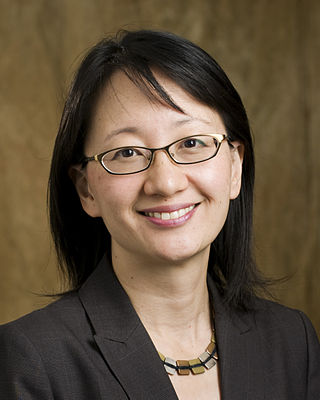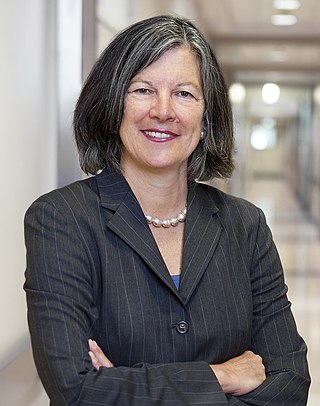Related Research Articles
The German Academic Exchange Service, founded in 1925, is the largest German support organisation in the field of international academic co-operation.

The German Cancer Research Center is a national cancer research center based in Heidelberg, Germany. It is a member of the Helmholtz Association of German Research Centres, the largest scientific organization in Germany.
George E. McCarthy is a professor of sociology at Kenyon College in Gambier, Ohio, USA.

Pakistani-Germans refers to the community in Germany of Pakistani heritage or citizenship.

Harald zur Hausen NAS EASA APS was a German virologist. He carried out research on cervical cancer and discovered the role of papilloma viruses in cervical cancer, for which he received the Nobel Prize in Physiology or Medicine in 2008. He was chairman of the German Cancer Research Center in Heidelberg.
Graham Andrew Colditz MD, DrPH is an Australian chronic disease epidemiologist. He is the inaugural Niess-Gain Professor at Washington University School of Medicine, where he is associate director for Prevention and Control at the Alvin J. Siteman Cancer Center. He directs the Master of Population Health Science at Washington University School of Medicine. During medical training he was excited by the potential for prevention of chronic diseases. With encouragement from mentors he pursued training in the US as it was routine for academics in Australia to obtain overseas training at that time. He is internationally recognized for leadership in cancer prevention, and is often interviewed by media for input on this topic. With members of Cancer Prevention and Control at Siteman, he blogs on issues relating to cancer prevention and screening. According to Google Scholar statistics, Colditz has a h-index of more than 300. Colditz was a member of the Institute of Medicine Committee to Review Adverse Effects of Vaccines but resigned, along with Ruby H. N. Nguyen, before it produced its seminal report.
Paolo Boffetta is an Italian epidemiologist. He is doing research on cancer and other chronic diseases, where he contributed to the understanding of the role of occupation, environment, alcohol, smoking and nutrition in disease development. In 2013, his candidacy for the position of Director of France's national center for research in epidemiology and public health was withdrawn as a result of his extensive consulting work for industry in lawsuits involving asbestos.

Brian J. Druker, M.D. is a physician-scientist at Oregon Health & Science University (OHSU), in Portland, Oregon. He is the chief executive officer of OHSU's Knight Cancer Institute, JELD-WEN Chair of Leukemia Research, Associate Dean for Oncology in the OHSU School of Medicine, and professor of medicine.
Philippe Autier is a Belgian epidemiologist. He is doing research on cancer, where he contributed to the understanding of the role of UV exposure in cancer development.
Carlo La Vecchia is an Italian epidemiologist. He is doing research on chronic diseases, where he contributed to the understanding of the risks related to diet, tobacco, oral contraceptive use and occupational or environmental exposure to toxic substances in cancer and other chronic diseases development.
The Institute of Molecular Biology (IMB) is a modern research centre on the campus of the Johannes Gutenberg University in Mainz, Germany. It is funded by the Boehringer Ingelheim Foundation and the state of Rheinland Palatinate. The scientists at IMB primarily conduct basic science in developmental biology, epigenetics, ageing, genome stability and related areas.

Vivian S. Lee is an American radiologist and health care/health technology executive. An Executive Fellow at Harvard Business School and senior lecturer at Harvard Medical School and Massachusetts General Hospital, Lee is the author of the book, The Long Fix: Solving America's Health Care Crisis with Strategies That Work for Everyone. Lee is also a senior fellow at the Institute for Healthcare Improvement (IHI) in Cambridge, Massachusetts. In 2019, she was named No. 11 in Modern Healthcare's 100 Most Influential People in Healthcare and is a frequent speaker at national and international meetings on the applications of big data, AI, and technology in healthcare, leadership and managing change, health equity, and on climate change and health system resilience.

Yitzhak Apeloig is a pioneer in the computational chemistry field of the Ab initio quantum chemistry methods for predicting and preparing the physical and chemical properties of materials. He was the president of the Technion from 2001 until 2009 where the position was handed off to Peretz Lavie. Distinguished Prof. Apeloig currently holds the Joseph Israel Freund Chair in Chemistry and is the co-director of the Lise Meitner Minerva Center for Computational Quantum Chemistry at the Technion. He served as dean of the Faculty of Chemistry from 1995 to 1999, where he was named Teacher of the Year at three occasions.

Mary C. Beckerle is an American cell biologist who studies cancer at the Huntsman Cancer Institute at the University of Utah School of Medicine. At Huntsman Cancer Institute, she serves as the CEO and also as Associate Vice President for Cancer Affairs at the University of Utah. Beckerle's research helped to define a novel molecular pathway for cell motility, and more recently, she has begun research into Ewing’s sarcoma, a pediatric bone cancer. Beckerle's lab made a ground breaking discovery in regards to Ewing's Sarcoma in relation to the EWS/FLI protein. Her lab discovered EWS/FLI to disrupt the internal cellular skeleton, which decreases the ability of cells to adhere to their proper environment. This can help explain the metastasis of tumors in patients with Ewing's sarcoma.

Eleanor Josephine Macdonald was a pioneer American cancer epidemiologist and cancer researcher influenced and mentored by Edwin Bidwell Wilson and Shields Warren. One of the earliest proponents of the idea that cancer was a preventable disease. She established the first cancer registry in the United States in Connecticut.
Elizabeth Terrell Hobgood "Terry" Fontham is an American cancer epidemiologist, public health researcher, and founding dean of the Louisiana State University Health Sciences Center New Orleans School of Public Health.

Curtis. C. Harris is the head of the Molecular Genetics and Carcinogenesis Section and chief of the Laboratory of Human Carcinogenesis at the Center for Cancer Research of the National Cancer Institute, NIH.

The Felix Burda Foundation is a German charitable foundation based in Offenburg. It was founded in 2001 by Christa Maar and Hubert Burda to improve the early detection of colorectal cancer. Among its most well-known initiatives is the "Darmkrebsmonat" or "Colon Cancer Month" in March.
Jan O. Korbel is a German scientist working in the fields of human genetics, genomics and computational biology.
References
- ↑ Austauschdienst, DAAD - Deutscher Akademischer. "Prof. Dr. Cornelia Ulrich - DAAD - Deutscher Akademischer Austauschdienst". www.daad.de. Archived from the original on 2017-12-05. Retrieved 2017-10-05.
- ↑ "Die Preisträger | Felix Burda Stiftung". www.felix-burda-stiftung.de (in German). Retrieved 2017-10-05.